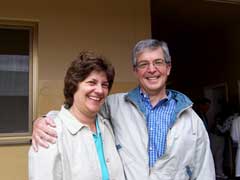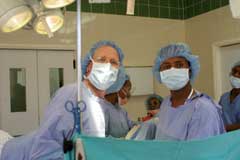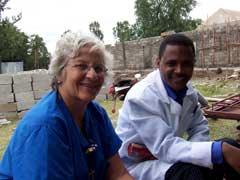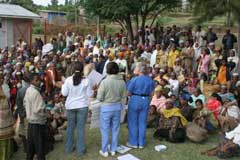Ethiopia
2006
~
Our work:
Medical care
health education

There were two parts to our mission: One was to work in the hospital, the other was the mobile clinics. The dentist and hygienist did their work - on patients who in 100% of cases had never seen a dental professional - in the hospital, and so did an "administrative" team - a doctor (Phil) and a nurse (Tara) who had organizational experience and interest. They spent a few days in the hospital looking at it from a systems standpoint, getting ideas for how future teams could provide continuing education for the nursing or physician staff.
The other thing that happened in the hospital setting was for me to work with the gynecologist (Dr. Tekle - 8 months out of his residency) in showing him an operation that will be helpful in his treatment of patients with prolapse. We spent some time together Saturday morning watching a video I had brought and talking about the procedure, then on Monday we did the surgery together. I modified a technique we use here in the US so that it could be done there without all the special equipment we have. He is a good surgeon and will be able to incorporate this surgery into his practice there, helping many women throughout his career.
The other part of our mission was the mobile clinics. These occured in four villages each about an hour from Yetebon. Each was predominantly Muslim, and each was very receptive to our care. We brought medicines and supplies from the US to care for common simple problems. In each village we were given the local health clinic as our base of operation. We set up a triage area, a pharmacy, and an exam room for each doctor. We had translators with the triage nurses, the pharmacy area, and each of the doctors. The translators were nurses from Addis and were excellent. They spoke English very well, they were trained in medical lingo, and they were familiar with tropical diseases, which was very helpful clinically.
We could only see about 30 patients per doctor per day, a number that was dwarfed by the number of people seeking care - so we established group clinics for common complaints like headache, dyspepsia, or dysuria. This allowed us to care for dozens or hundreds with those problems. Group sessions of general health education were also part of each day - discussions about dehydration, nutrition, hygiene, respiratory diseases, parasites, etc. were given to the hundreds of people that were present each day.
One difficult job each day was deciding which patients would get the 30 or so tickets to see each doctor. We would walk through the crowds with a translator talking to people and looking for individuals who looked the sickest. We looked for malnourished babies, the weak, or the ones who looked so sick they might not be able to speak up for themselves.






